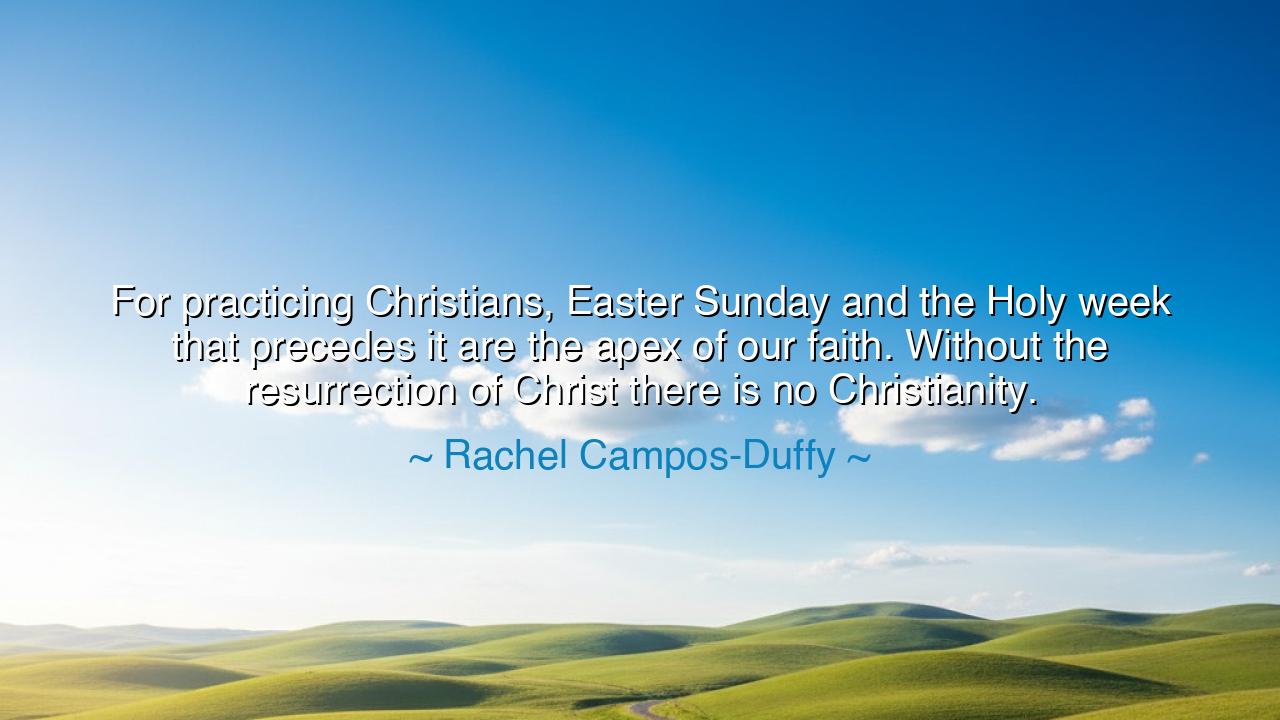
For practicing Christians, Easter Sunday and the Holy week that
For practicing Christians, Easter Sunday and the Holy week that precedes it are the apex of our faith. Without the resurrection of Christ there is no Christianity.






When Rachel Campos-Duffy said, “For practicing Christians, Easter Sunday and the Holy Week that precedes it are the apex of our faith. Without the resurrection of Christ there is no Christianity,” she was not merely affirming a doctrine — she was proclaiming the very heartbeat of Christian belief. Her words reach back through two thousand years of history to the dawn of hope itself, to the empty tomb where sorrow was transformed into victory. For in the resurrection of Christ lies not only the foundation of faith, but the meaning of life, the triumph of love over death, and the eternal promise that darkness will never conquer light.
The origin of this truth is found in the Gospel itself, where the story of humanity meets the mercy of God. In the ancient world, death was considered the ultimate master, the final certainty. Empires rose and fell beneath its shadow, and even the wisest philosophers could only speculate on what lay beyond the grave. Then came the Resurrection — not as a symbol or myth, but as a divine act that shattered the chains of mortality. From that moment, the world was forever changed. Christianity did not begin at the manger, nor on the mountain, but at the empty tomb, where faith beheld what reason could not comprehend: that love stronger than death had entered the world.
Campos-Duffy’s statement reflects this truth in its simplest and most powerful form: Without the resurrection, there is no Christianity. The teachings of Jesus, though profound, would have remained moral philosophy had He not conquered death. His miracles, though wondrous, would have faded into legend. But by rising from the dead, He confirmed that His words were not just wisdom — they were divine truth. The apostles, once fearful and broken, became heralds of courage because they had seen the impossible made real. The cross, once a symbol of shame, became the banner of redemption. Thus, Easter is not merely a celebration — it is the axis upon which all Christian faith turns.
In history, we see how this belief has inspired the greatest transformations of the human spirit. The early Christians, persecuted by Rome, faced lions and flames not with despair but with joy, because they believed death could not hold them. When Polycarp, the aged bishop of Smyrna, was condemned to die, he refused to renounce his faith, saying, “Eighty-six years have I served Him, and He has done me no wrong.” He went to the stake singing hymns, knowing that resurrection awaited him beyond the fire. Such courage cannot be explained by earthly hope; it is born only of the certainty that life does not end in the grave.
The Holy Week leading to Easter — from the sorrow of Good Friday to the glory of the Resurrection — mirrors the journey of every believer. It teaches that suffering is not meaningless, that pain may be the prelude to renewal. Just as Christ descended into death before rising again, so too must each soul pass through its own dark nights before it beholds the dawn. This is why Campos-Duffy calls Easter the “apex” — for it gathers into one radiant moment all that Christianity teaches: sacrifice, forgiveness, renewal, and everlasting life.
To understand Easter, one must see it not as a day of ritual but as a living revelation. It is the declaration that despair is never final, that every crucifixion contains the seed of resurrection. The early church fathers often said, “Christ trampled death by death,” meaning that He transformed the very weapon of defeat into the instrument of victory. This paradox — that life is found through death, and triumph through humility — remains the greatest mystery and the deepest wisdom of the faith.
And so, the lesson is eternal: faith without resurrection is merely morality, but faith with resurrection is life itself. Campos-Duffy reminds all who listen that Easter is not only the story of Christ’s victory, but of our own potential for renewal. Let each heart remember: when all seems lost, when the stone lies heavy upon our dreams, there is still a dawn waiting to break. Live, then, not as those who fear the end, but as those who have seen the tomb empty. For the resurrection is not only an event in history — it is a call to rise each day from the ashes of despair into the light of everlasting hope.






AAdministratorAdministrator
Welcome, honored guests. Please leave a comment, we will respond soon